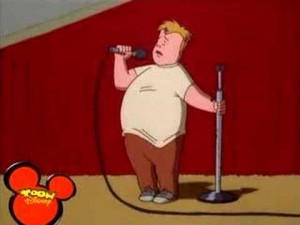If you’re the main character of a TV show, of any genre, you better have some balls. Why sensitive male leads are difficult to come by.
When preparing for my “Prepubescent Girls that Can Kick Your Ass” inventory, a friend of mine mentioned thinking about, essentially, the opposite version: the sensitive male. She was curious about where the low-key, poetry-loving, caring, affectionate, “not-afraid-to-talk-about-his-feelings” men were in our entertainment. I began thinking about this too, and, well, it’s a pretty good question.
I’m currently watching Recess, the Paul Germain/Joe Ansolabehere animated show that appeared on One Saturday Morning, an ABC/Disney block of cartoons that included The Brand-Spanking New Doug, Pepper Ann, and The Weekenders. Recess was pretty much the winner, nailing a full six seasons and two movies. And of the six main characters, Mikey represented exactly what my friend and I were looking for – the sensitive male as a main character (or at least one of many).
It shouldn’t really surprise me, then, to see most Youtube comment expressing their hate of Mikey. It’s disappointing to see that much vitriol – Mikey does nothing narratively wrong or unlikeable – but it is somewhat difficult to muster a lot of support for his emotional outbursts and poetic diatribes on competition, justice, and Santa Claus. Part of the issue is that it’s hard to understand why exactly Mikey is the way he is. We don’t get too much on his childhood or parents, unlike the rest of the cast, and seeing him struggle with standing up for himself, even for simple things, is a bit hard to swallow, even for kids. And then it hit me: sensitive male leads are, narratively, dead-weight.
Well, not all of them. (I point one out later in the piece that may be an exception.) But for the most part, sensitive males, being more introverted, quiet, and non-confrontational, push against the narrative necessity for conflict to brew. If the character can’t, or is unwilling, to engage in conflict, then it’s hard to create a plot using that archetype. Conflicts that do involve them often involve “growing a backbone,” becoming more confident and standing up to bullies. But few pieces of entertainment touch upon the nature of sensitivity as a positive development towards a goal, unless it’s involves romancing the opposite sex.
(Keep in mind, a lot of what I mentioned can be applied to sensitive female characters too; it’s unfortunate but true that social constructs allow sensitive female characters to be more prevalent, yet we see more or them as progenitors of their own development – see Fluttershy from My Little Pony or Kaylee from Firefly. It also helps that Josh Whedon and Lauren Faust are very talented. In other words, we’re used to, and comfortable with, sensitive female characters. Not so much with males.)
There is a unique exception to this: Private, from The Penguins of Madagascar TV show on Nickelodeon, a surprisingly excellent show in its own right. Private, the “newest” recruit in the penguins underground, paramilitary organization, is indeed a sensitive soul, enjoying The Lunicorns, being a neat-freak, and not afraid to showcase his feelings, to the chagrin of his team. But quite often, Private is shown to be smart, pragmatic, and a hell of a soldier, both in cunning, speed, and ability to fight. It’s a rare sight – not even the highest-rated TV shows have male characters that can exhibit both sensitivity and bravado. And, consequently, he’s become one of my favorite characters on TV right now.
But even in the case of Penguins or Recess, the sensitive male is not the SOLE lead, but part of a group dynamic. I’d be hard pressed to find any show that really had or has a soft-ball character leading a narrative charge. There’s Lazlo from Camp Lazlo, I suppose, although his sense of adventure may overshadow his sensitive nature. The brief encounter I had with the show Scaredy Squirrel had a character similar to Private, sans fighting ability, so maybe he is the true exception – yet no one watched the show, which doubles down on my “lack of popularity” theory.
Are there any male lead characters out there that are relatively well-know? I’m thinking no, but I’m definitely willing to hear people out in the comments below.

Comments are closed